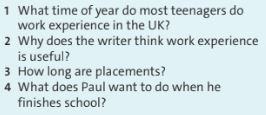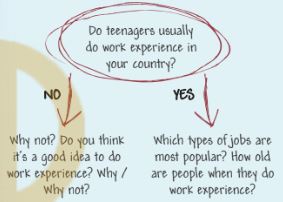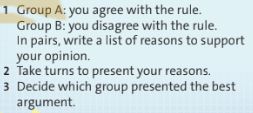HOC247 xin gß╗¡i ─æß║┐n c├íc em b├ái hß╗ìc CLIL & Culture - Culture Chã░ãíng tr├¼nh Tiß║┐ng Anh lß╗øp 8 Ch├ón trß╗Øi s├íng tß║ío. Th├┤ng qua b├ái hß╗ìc n├áy, c├íc em c├│ thß╗â n├│i vß╗ü nhß╗»ng lß╗úi ├¡ch cß╗ºa kinh nghiß╗çm l├ám viß╗çc, ├┤n tß║¡p v├á cß╗ºng cß╗æ th├¬m vß╗æn tß╗½ vß╗▒ng xoay quanh chß╗º ─æß╗ü ÔÇ£Work experienceÔÇØ. Ch├║c c├íc em hß╗ìc vui v├á c├│ kß║┐t quß║ú tß╗æt!
Tóm tắt bài
1.1. CLIL & Culture lß╗øp 8 Culture Task 1
Look at the photos and answer the questions. Then read the article and check your answers.
(Xem ß║únh v├á trß║ú lß╗Øi c├óu hß╗Åi. Sau ─æ├│ ─æß╗ìc b├ái viß║┐t v├á kiß╗âm tra c├óu trß║ú lß╗Øi cß╗ºa bß║ín.)
1. What job categories can you see?
(Bạn có thể xem những danh mục công việc nào?)
2. Why do you think some teenagers work in their holidays?
(Bß║ín ngh─® tß║íi sao mß╗Öt sß╗æ thanh thiß║┐u ni├¬n l├ám viß╗çc trong nhß╗»ng ng├áy nghß╗ë cß╗ºa hß╗ì?)

The world of work experience
Forget relaxing with friends. The end of the school year is a time for working for most fourteen- and fifteen-year-olds in the UK. Around half a million teenagers in the UK do work experience every summer. This is a useful way to find out which jobs you might enjoy in the future. It is also important when you apply for university, or get a job in the future. For example, if you want to study to be an engineer, you could do work experience with a car manufacturer. Other popular work experience placements are in teaching, marketing, media, and finance. Placements usually last two weeks. Some teenagers have no idea what job they want to do. In this case, they need to think about their passions. For example, if you are interested in music, you could work in a music shop. Alternatively, if you love animals, you could work on a farm.
My work experience: Hi, IÔÇÖm Paul, and IÔÇÖve just done two weeksÔÇÖ work experience on a farm near where I live. It was brilliant. I enjoyed giving the animals their food in the morning. I also made sure the animals had exercise and I kept everything clean. At night, I helped to put the animals inside. It was hard work but I loved it. I hope the farm will give me a job when I finish school.
Tạm dịch:
Thß║┐ giß╗øi kinh nghiß╗çm l├ám viß╗çc
H├úy qu├¬n viß╗çc thã░ gi├ún vß╗øi bß║ín b├¿. Cuß╗æi n─âm hß╗ìc l├á thß╗Øi gian l├ám viß╗çc cß╗ºa hß║ºu hß║┐t hß╗ìc sinh 14, 15 tuß╗òi ß╗ƒ Anh. Khoß║úng nß╗¡a triß╗çu thanh thiß║┐u ni├¬n ß╗ƒ Vã░ãíng quß╗æc Anh trß║úi nghiß╗çm c├┤ng viß╗çc mß╗ùi m├╣a h├¿. ─É├óy l├á mß╗Öt c├ích hß╗»u ├¡ch ─æß╗â t├¼m ra c├┤ng viß╗çc n├áo bß║ín c├│ thß╗â th├¡ch trong tã░ãíng lai. N├│ c┼®ng quan trß╗ìng khi bß║ín nß╗Öp ─æãín v├áo trã░ß╗Øng ─æß║íi hß╗ìc, hoß║Àc kiß║┐m viß╗çc l├ám trong tã░ãíng lai. V├¡ dß╗Ñ: nß║┐u bß║ín muß╗æn hß╗ìc ─æß╗â trß╗ƒ th├ánh kß╗╣ sã░, bß║ín c├│ thß╗â trß║úi nghiß╗çm c├┤ng viß╗çc vß╗øi mß╗Öt nh├á sß║ún xuß║Ñt ├┤ t├┤. C├íc vß╗ï tr├¡ kinh nghiß╗çm l├ám viß╗çc phß╗ò biß║┐n kh├íc l├á giß║úng dß║íy, tiß║┐p thß╗ï, truyß╗ün th├┤ng v├á t├ái ch├¡nh. C├íc vß╗ï tr├¡ thã░ß╗Øng k├®o d├ái hai tuß║ºn. Mß╗Öt sß╗æ thanh thiß║┐u ni├¬n kh├┤ng biß║┐t hß╗ì muß╗æn l├ám c├┤ng viß╗çc g├¼. Trong trã░ß╗Øng hß╗úp n├áy, hß╗ì cß║ºn suy ngh─® vß╗ü ─æam m├¬ cß╗ºa m├¼nh. V├¡ dß╗Ñ: nß║┐u bß║ín quan t├óm ─æß║┐n ├óm nhß║íc, bß║ín c├│ thß╗â l├ám viß╗çc trong mß╗Öt cß╗¡a h├áng ├óm nhß║íc. Ngo├ái ra, nß║┐u bß║ín y├¬u ─æß╗Öng vß║¡t, bß║ín c├│ thß╗â l├ám viß╗çc trong trang trß║íi.
Kinh nghiß╗çm l├ám viß╗çc cß╗ºa t├┤i: Xin ch├áo, t├┤i l├á Paul, v├á t├┤i vß╗½a mß╗øi ho├án th├ánh hai tuß║ºn kinh nghiß╗çm l├ám viß╗çc tß║íi mß╗Öt trang trß║íi gß║ºn nãíi t├┤i sß╗æng. N├│ thß║¡t tuyß╗çt vß╗Øi. T├┤i rß║Ñt th├¡ch cho c├íc con vß║¡t ─ân v├áo buß╗òi s├íng. T├┤i c┼®ng ─æß║úm bß║úo rß║▒ng c├íc con vß║¡t ─æã░ß╗úc tß║¡p thß╗â dß╗Ñc v├á t├┤i giß╗» mß╗ìi thß╗® sß║ích sß║¢. V├áo ban ─æ├¬m, t├┤i gi├║p ─æã░a nhß╗»ng con vß║¡t v├áo b├¬n trong. ─É├│ l├á c├┤ng viß╗çc kh├│ kh─ân nhã░ng t├┤i y├¬u th├¡ch n├│. T├┤i hy vß╗ìng trang trß║íi sß║¢ cho t├┤i mß╗Öt c├┤ng viß╗çc khi t├┤i hß╗ìc xong.
Guide to answer
1. Job categories I can see:
(Danh mục công việc tôi có thể thấy:)
- Picture A: Teaching
(Hình A: Giảng dạy)
- Picture B: Engineering
(Hình B: Kỹ thuật)
- Picture C: Media
(Hình C: Truyền thông)
- Picture D: Finance
(Hình D: Tài chính)
2. I think some teenagers work in their holidays to gain valuable work experience and improve soft skills which can be beneficial for their future career prospects.
(T├┤i ngh─® rß║▒ng mß╗Öt sß╗æ thanh thiß║┐u ni├¬n l├ám viß╗çc trong kß╗│ nghß╗ë cß╗ºa hß╗ì ─æß╗â t├¡ch l┼®y kinh nghiß╗çm l├ám viß╗çc qu├¢ b├íu v├á cß║úi thiß╗çn kß╗╣ n─âng mß╗üm, ─æiß╗üu n├áy c├│ thß╗â c├│ lß╗úi cho triß╗ân vß╗ìng nghß╗ü nghiß╗çp trong tã░ãíng lai cß╗ºa hß╗ì.)
1.2. CLIL & Culture lß╗øp 8 Culture Task 2
Read and listen to the article again and answer the questions.
(─Éß╗ìc v├á nghe lß║íi b├ái viß║┐t v├á trß║ú lß╗Øi c├óu hß╗Åi.)
Guide to answer
1. Most teenagers do work experience in the UK in the summer.
(Hß║ºu hß║┐t thanh thiß║┐u ni├¬n trß║úi nghiß╗çm c├┤ng viß╗çc tß║íi Vã░ãíng quß╗æc Anh v├áo m├╣a h├¿.)
2. Because itÔÇÖs a useful way to find out what jobs you might want to do in the future. It can also help you to get a job.
(Bß╗ƒi v├¼ ─æ├│ l├á mß╗Öt c├ích hß╗»u ├¡ch ─æß╗â t├¼m ra nhß╗»ng c├┤ng viß╗çc m├á bß║ín c├│ thß╗â muß╗æn l├ám trong tã░ãíng lai. N├│ c┼®ng c├│ thß╗â gi├║p bß║ín c├│ ─æã░ß╗úc mß╗Öt c├┤ng viß╗çc.)
3. Placements usually last two weeks.
(C├íc vß╗ï tr├¡ thã░ß╗Øng k├®o d├ái hai tuß║ºn.)
4. Paul wants to go back to work on the farm when he finishes school.
(Paul muốn quay lại làm việc ở nông trại sau khi học xong.)
1.3. CLIL & Culture lß╗øp 8 Culture Task 3
Your Culture - Work in pairs and answer the questions.
(L├ám viß╗çc theo cß║Àp v├á trß║ú lß╗Øi c├íc c├óu hß╗Åi.)
Guide to answer
- Yes, teenagers usually do work experience in my country. Part-time or seasonal jobs, such as working in restaurants, cafes, or retail stores, are the most popular choices for work experience. This provides teenagers with the opportunity to gain practical skills and interact with customers.
(V├óng, thanh thiß║┐u ni├¬n thã░ß╗Øng l├ám c├┤ng viß╗çc trß║úi nghiß╗çm ß╗ƒ ─æß║Ñt nã░ß╗øc cß╗ºa t├┤i. C├┤ng viß╗çc b├ín thß╗Øi gian hoß║Àc thß╗Øi vß╗Ñ, chß║│ng hß║ín nhã░ l├ám viß╗çc trong nh├á h├áng, qu├ín c├á ph├¬ hoß║Àc cß╗¡a h├áng b├ín lß║╗, l├á nhß╗»ng lß╗▒a chß╗ìn phß╗ò biß║┐n nhß║Ñt ─æß╗â c├│ kinh nghiß╗çm l├ám viß╗çc. ─Éiß╗üu n├áy cung cß║Ñp cho thanh thiß║┐u ni├¬n cãí hß╗Öi ─æß╗â ─æß║ít ─æã░ß╗úc c├íc kß╗╣ n─âng thß╗▒c tß║┐ v├á tã░ãíng t├íc vß╗øi kh├ích h├áng.)
1.4. CLIL & Culture lß╗øp 8 Culture Task 4
USE IT! Imagine your country has a new rule: All fourteen-year-olds must do work experience in the school holidays. Prepare a class debate. Follow instructions 1ÔÇô3.
(H├úy tã░ß╗ƒng tã░ß╗úng ─æß║Ñt nã░ß╗øc cß╗ºa bß║ín c├│ mß╗Öt quy tß║»c mß╗øi: Tß║Ñt cß║ú hß╗ìc sinh mã░ß╗Øi bß╗æn tuß╗òi phß║úi trß║úi nghiß╗çm c├┤ng viß╗çc trong nhß╗»ng ng├áy nghß╗ë hß╗ìc. Chuß║®n bß╗ï mß╗Öt cuß╗Öc tranh luß║¡n trong lß╗øp. L├ám theo hã░ß╗øng dß║½n 1ÔÇô3.)
Guide to answer
Group A: Mandatory work experience would provide valuable opportunities for fourteen-year-olds to develop practical skills that cannot be learned solely within the confines of a classroom. It allows students to gain real-world experience, develop a work ethic, and acquire skills such as teamwork, communication, and problem-solving.
(Nh├│m A: Kinh nghiß╗çm l├ám viß╗çc bß║»t buß╗Öc sß║¢ mang ─æß║┐n nhß╗»ng cãí hß╗Öi qu├¢ gi├í cho nhß╗»ng ─æß╗®a trß║╗ mã░ß╗Øi bß╗æn tuß╗òi ph├ít triß╗ân nhß╗»ng kß╗╣ n─âng thß╗▒c tß║┐ kh├┤ng thß╗â hß╗ìc ─æã░ß╗úc chß╗ë trong phß║ím vi lß╗øp hß╗ìc. N├│ cho ph├®p hß╗ìc sinh c├│ ─æã░ß╗úc kinh nghiß╗çm thß╗▒c tß║┐, ph├ít triß╗ân ─æß║ío ─æß╗®c l├ám viß╗çc v├á c├│ ─æã░ß╗úc c├íc kß╗╣ n─âng nhã░ l├ám viß╗çc nh├│m, giao tiß║┐p v├á giß║úi quyß║┐t vß║Ñn ─æß╗ü.)
Group B: Fourteen-year-olds are still in the crucial stage of adolescence, where they require time for personal growth, self-discovery, and building relationships. Mandatory work experience might impose excessive responsibilities and restrict their opportunities for leisure, self-exploration, and other formative experiences.
(Nh├│m B: Nhß╗»ng ngã░ß╗Øi mã░ß╗Øi bß╗æn tuß╗òi vß║½n ─æang trong giai ─æoß║ín quan trß╗ìng cß╗ºa tuß╗òi thiß║┐u ni├¬n, nãíi hß╗ì cß║ºn thß╗Øi gian ─æß╗â ph├ít triß╗ân c├í nh├ón, kh├ím ph├í bß║ún th├ón v├á x├óy dß╗▒ng c├íc mß╗æi quan hß╗ç. Kinh nghiß╗çm l├ám viß╗çc bß║»t buß╗Öc c├│ thß╗â ├íp ─æß║Àt c├íc tr├ích nhiß╗çm qu├í mß╗®c v├á hß║ín chß║┐ cãí hß╗Öi giß║úi tr├¡, kh├ím ph├í bß║ún th├ón v├á c├íc trß║úi nghiß╗çm h├¼nh th├ánh kh├íc cß╗ºa hß╗ì.)
Group A: Work experience at a young age can help teenagers explore different career paths and make more informed decisions about their future. It exposes them to various industries, giving them a firsthand understanding of the demands and challenges of different occupations.
(Nh├│m A: Kinh nghiß╗çm l├ám viß╗çc khi c├▓n trß║╗ c├│ thß╗â gi├║p thanh thiß║┐u ni├¬n kh├ím ph├í nhß╗»ng con ─æã░ß╗Øng sß╗▒ nghiß╗çp kh├íc nhau v├á ─æã░a ra nhß╗»ng quyß║┐t ─æß╗ïnh s├íng suß╗æt hãín vß╗ü tã░ãíng lai cß╗ºa hß╗ì. N├│ gi├║p hß╗ì tiß║┐p x├║c vß╗øi nhiß╗üu ng├ánh c├┤ng nghiß╗çp kh├íc nhau, gi├║p hß╗ì hiß╗âu biß║┐t trß╗▒c tiß║┐p vß╗ü nhu cß║ºu v├á th├ích thß╗®c cß╗ºa c├íc ng├ánh nghß╗ü kh├íc nhau.)
Group B: Adolescence is a time of significant emotional and physical changes. It is important for teenagers to have adequate time for rest, relaxation, and leisure activities during school holidays. Mandatory work experience may lead to increased stress, fatigue, and burnout among fourteen-year-olds, potentially affecting their well-being and mental health.
(Nh├│m B: Tuß╗òi vß╗ï th├ánh ni├¬n l├á thß╗Øi ─æiß╗âm c├│ nhß╗»ng thay ─æß╗òi ─æ├íng kß╗â vß╗ü cß║úm x├║c v├á thß╗â chß║Ñt. ─Éiß╗üu quan trß╗ìng l├á thanh thiß║┐u ni├¬n phß║úi c├│ ─æß╗º thß╗Øi gian ─æß╗â nghß╗ë ngãíi, thã░ gi├ún v├á tham gia c├íc hoß║ít ─æß╗Öng giß║úi tr├¡ trong nhß╗»ng ng├áy nghß╗ë hß╗ìc. Kinh nghiß╗çm l├ám viß╗çc bß║»t buß╗Öc c├│ thß╗â dß║½n ─æß║┐n c─âng thß║│ng, mß╗çt mß╗Åi v├á kiß╗çt sß╗®c gia t─âng ß╗ƒ nhß╗»ng ─æß╗®a trß║╗ mã░ß╗Øi bß╗æn tuß╗òi, c├│ khß║ú n─âng ß║únh hã░ß╗ƒng ─æß║┐n sß╗®c khß╗Åe v├á tinh thß║ºn cß╗ºa ch├║ng.)
Bài tập minh họa
Read the following passage and mark the letter A, B, C, or D on your answer sheet to indicate the correct word or phrase that best fits each of the numbered blanks from 1-5
The Art World
One of the major problems in the art world is how to distinguish and promote an artist. In effect, a market must be created for an artist to be successful. The practice of signing and numbering individual prints was introduced by James Abbott McNeill Whistler, the nineteenth-century artist best known for the painting of his mother, called "Arrangement in Grey and Black", but known to most of US as "Whistler's Mother". Whistler's brother-in-law, Sir Francis Seymour Haden, a less well-known artist, had speculated that collectors might find prints more attractive if they knew that there were only a limited number of copies produced. By signing the work in pencil, an artist could guarantee and personalize each print.
As soon as Whistler and Haden began the practice of signing and numbering their prints, thefr work began to increase in value. When other artists noticed that the signed prints commanded higher prices, they began copying the procedure.
Although most prints are signed on the right-hand side in the margin below the image, the placement of the signature is a matter of personal choice. Indeed, prints have been signed within image, in any of the margins, or even on the reverse side of the 'print. Wherever the artist elects to sign it, a signed print is still valued above an unsigned one, even in the same edition.
Question 1: Which of the following would be a better title for the passage?
A. Whistler's Mother. B. Whistler's Greatest Works,
C. The Practice of Signing Prints. D. Copying Limited Edition Prints.
Question 2: What made Whistler's work more valuable?
A. His fame as an artist. B. His painting of his mother,
C. His signature on the prints. D. His brother-in-law's prints.
Question 3: The word ÔÇ£speculatedÔÇØ in the paragraph I could best be replaced by .
A. guessed B. noticed C. denied D. announced
Question 4: The word ÔÇ£itÔÇØ in paragraph 3 refers to .
A. the same edition B. the image C. the reverse side D. a print
Question 5: The author mentions all of the following as reasons why a collector prefers a signed print EXCEPT .
A. it guarantees the print's authenticity B. it makes the print more personal
C. it encourages higher prices for the print D. it limits the number of copies of the print
Đáp án (Key)
Question 1: C
Question 2: C
Question 3: A
Question 4: D
Question 5: C
Luyện tập
3.1. Kết luận
Qua b├ái hß╗ìc n├áy c├íc em cß║ºn ghi nhß╗ø c├íc tß╗½ vß╗▒ng sau:
- find out: tìm ra
- apply for: nộp vào
- car manufacturer: nhà sản xuất ô tô
- work experience placement: vị trí kinh nghiệm làm việc
3.2. Bài tập trắc nghiệm CLIL & Culture - Culture
Nhã░ vß║¡y l├á c├íc em ─æ├ú xem qua b├ái giß║úng phß║ºn CLIL & Culture - Culture chã░ãíng tr├¼nh Tiß║┐ng Anh lß╗øp 8 Ch├ón trß╗Øi s├íng tß║ío. ─Éß╗â cß╗ºng cß╗æ kiß║┐n thß╗®c b├ái hß╗ìc mß╗Øi c├íc em tham gia b├ái tß║¡p trß║»c nghiß╗çm Trß║»c nghiß╗çm CLIL & Culture lß╗øp 8 Ch├ón trß╗Øi s├íng tß║ío Culture: Work experience.
C├óu 4-10: Mß╗Øi c├íc em ─æ─âng nhß║¡p xem tiß║┐p nß╗Öi dung v├á thi thß╗¡ Online ─æß╗â cß╗ºng cß╗æ kiß║┐n thß╗®c vß╗ü b├ái hß╗ìc n├áy nh├®!
Hỏi đáp CLIL & Culture - Culture Tiếng Anh 8
Trong quá trình học tập nếu có thắc mắc hay cần trợ giúp gì thì các em hãy comment ở mục Hỏi đáp, Cộng đồng Tiếng Anh HOC247 sẛ hỗ trợ cho các em một cách nhanh chóng!
Chúc các em học tập tốt và luôn đạt thành tích cao trong học tập!
-- Mod Tiếng Anh 8 HỌC247














